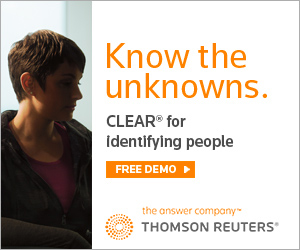|
This ABA Banking Journal newsletter is a free, twice-monthly supplement to the ABA Banking Journal magazine intended to help you stay on top of industry and policy news.
You can also stay abreast of banking news by visiting aba.com/BankingJournal, home to ABA Daily Newsbytes and other email bulletins.
Imagine, for a moment, a global, online ledger, or network of ledgers, listing every single transaction in the world. It's verified immediately by other people using the system, which protects people's privacy, but is transparent enough to allow for oversight from anyone. No one group regulates it, so it's neutral and accessible to anyone with a computer. That is the world that visionaries of the blockchain foresee. (All Tech Considered)
|
For a long time, compliance in the average bank was a sequestered activity handled by a relatively tiny group. But today, carrying the regulation burden requires a much more orchestrated, strategic effort from the entire organization. And for most banks, that requires a big shift toward creating a culture of compliance. (ABA Banking Journal)
|
A subsection of the link-sharing site is helping borrowers with bad credit get emergency loans. When asked if they’d be able to cover a $400 emergency expense, nearly half of all respondents to a 2014 Federal Reserve study said that they wouldn’t have enough cash on hand. Most told the Fed they would try for a bank loan, use a credit card, or ask family and friends. Two percent of respondents said they would take out a payday loan. Now, some borrowers are asking strangers for money on Reddit instead. (The Atlantic)
|
Thieves have again found their way into what was thought to be the most secure financial messaging system in the world and stolen money from a bank. The crime appears to be part of a broad online attack on global banking. (New York Times)
|
The U.S. banking industry has largely sat out the impressive surge in mergers and acquisitions activity of the last few years. Total deal volume hit a record US$2.3 trillion in 2015—up 64 percent over 2014. But banks accounted for just 3 percent of the total value, despite the fact that they account for 9.3 percent of total market capitalization. That’s about to change: We believe the pace of M&A in U.S. banking will accelerate sharply in 2016. (Strategy + Business)
|
Google is banning ads for payday loans and some related products from its ads systems, according to a statement the company released this week. Starting July 13, the company will no longer allow ads for loans where repayment is due within 60 days of the date of issue. In the U.S., it is also banning ads for loans with an APR of 36 percent or higher. (CNBC)
|
For criminals looking to sell drugs, fund terrorism, evade taxes or bribe government officials, cash is king. That's why a growing chorus of academics and policy makers want to do away with high-denomination bills around the world, culminating last week in the European Central Bank's decision to stop printing the 500 euro note. But does this put us on a slippery slope toward a cashless society, where Big Brother can monitor our every financial move? (Bloomberg)
|

In a letter to leaders of the Senate Committee on Small Business and Entrepreneurship yesterday, ABA urged lawmakers to support the Protecting Workplace Advancement and Opportunity Act, a bill that would nullify a proposed rule by the Department of Labor to dramatically increase the salary threshold for employees to be exempt from overtime. The letter came in advance of a committee hearing on the rule today. (ABA Banking Journal)
|
Business groups are harshly criticizing new rules from the Consumer Financial Protection Bureau that would make it easier for consumers to sue financial companies. The consumer watchdog unveiled proposed rules Thursday that would bar banks and credit card companies from barring consumers from building class-action lawsuits against them. (The Hill)
|
A total of 130 OCC-regulated savings associations signed onto an ABA letter this week urging congressional leaders to support legislation that would allow institutions chartered under the Home Owners’ Loan Act to elect to operate more like banks without having to change their charters—a key part of ABA’s Agenda for America’s Hometown Banks. (ABA Banking Journal)
|
In a joint letter to the Department of Homeland Security and the Department of Justice this week, ABA and other financial trade associations called for more guidance to help their member organizations expand or enhance the sharing of cyber threat information under the framework created by the Cybersecurity Information Sharing Act. (ABA Banking Journal)
|
While online marketplace lenders are subject to many of the same rules as banks for loan originations, marketplace lenders receive less direct oversight, the Treasury Department said today in its long-awaited report on the marketplace lending industry. Providing more "effective oversight" of nonbank lenders could lead to greater transparency and "better outcomes for borrowers," the Treasury found. (ABA Banking Journal)
|

June 2-9
Philadelphia, PA
June 8-15
Atlanta, GA
June 12-15
San Diego, CA
|
|








